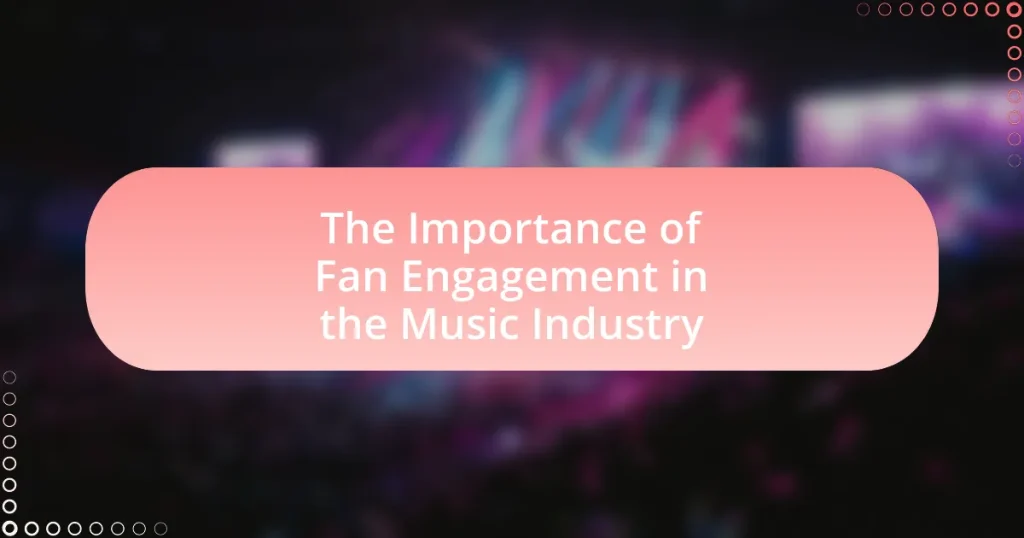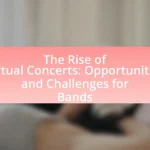Fan engagement is a critical factor in the music industry, directly impacting an artist’s success and longevity. Engaged fans are more likely to purchase music, attend concerts, and promote artists, leading to increased revenue and visibility. The article explores the significance of fan engagement for artists and labels, its influence on career trajectories, and its role in revenue generation. It also examines the social benefits of strong fan relationships, strategies for enhancing engagement, and the challenges artists face in maintaining these connections. Key metrics for assessing engagement effectiveness and best practices for building a community around music are also discussed.
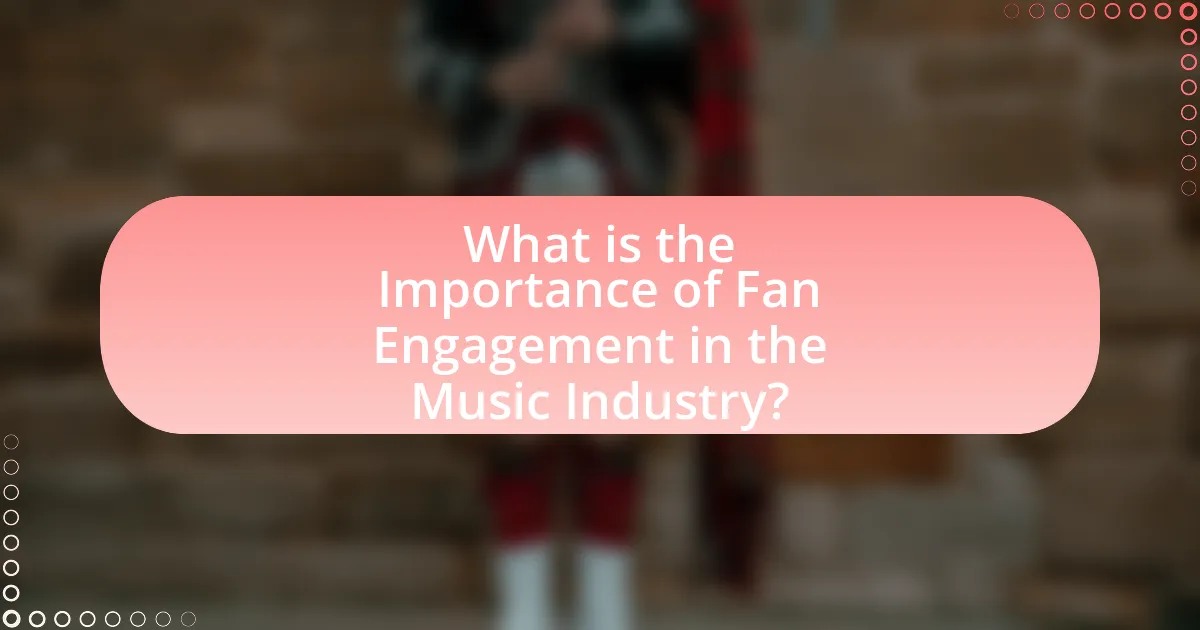
What is the Importance of Fan Engagement in the Music Industry?
Fan engagement is crucial in the music industry as it directly influences an artist’s success and longevity. Engaged fans are more likely to purchase music, attend concerts, and promote the artist through word-of-mouth, which can significantly increase revenue streams. For instance, a study by Nielsen Music found that 70% of fans are more likely to buy merchandise from artists they feel connected to, highlighting the financial benefits of strong fan relationships. Additionally, fan engagement fosters a sense of community, which can lead to increased loyalty and sustained support over time.
Why is fan engagement crucial for artists and labels?
Fan engagement is crucial for artists and labels because it directly influences their success and sustainability in the music industry. Engaged fans are more likely to purchase music, attend concerts, and promote the artist through word-of-mouth, which can lead to increased revenue and visibility. According to a study by Nielsen Music, 70% of fans are willing to pay for exclusive content and experiences, highlighting the financial benefits of strong fan relationships. Additionally, fan engagement fosters loyalty, which is essential in a competitive market where numerous artists vie for attention.
How does fan engagement influence an artist’s career trajectory?
Fan engagement significantly influences an artist’s career trajectory by enhancing visibility, driving sales, and fostering loyalty. When artists actively engage with their fans through social media, live performances, and personalized content, they create a strong community that supports their work. For instance, a study by the University of Southern California found that artists with higher fan engagement on platforms like Instagram and Twitter saw a 30% increase in album sales compared to those with lower engagement levels. This direct interaction not only boosts immediate financial success but also cultivates long-term relationships that can lead to sustained career growth and opportunities, such as collaborations and sponsorships.
What role does fan engagement play in revenue generation?
Fan engagement is crucial for revenue generation in the music industry as it directly influences ticket sales, merchandise purchases, and streaming revenue. Engaged fans are more likely to attend concerts, buy albums, and support artists through various platforms, leading to increased financial returns. For instance, a study by the Music Industry Research Association found that artists with higher fan engagement levels saw a 30% increase in concert attendance and a 25% boost in merchandise sales compared to those with lower engagement. This demonstrates that fostering strong connections with fans not only enhances loyalty but also significantly contributes to an artist’s overall revenue stream.
How does fan engagement impact the music community?
Fan engagement significantly enhances the music community by fostering a sense of belonging and loyalty among listeners. Engaged fans actively participate in discussions, share content, and attend events, which amplifies the visibility of artists and their work. For instance, a study by the University of Southern California found that artists with high fan engagement on social media platforms experience a 30% increase in concert attendance and merchandise sales. This interaction not only supports artists financially but also cultivates a vibrant community where fans feel connected to each other and the music.
What are the social benefits of strong fan engagement?
Strong fan engagement fosters community building among fans, enhancing social connections and shared experiences. This engagement leads to increased social interaction, as fans often participate in discussions, attend events together, and form friendships based on their shared interests in music and artists. Research indicates that engaged fans are more likely to support each other and collaborate on projects, creating a sense of belonging. Additionally, strong fan engagement can amplify social movements, as fans mobilize around causes endorsed by their favorite artists, demonstrating the power of collective action in promoting social change.
How does fan engagement foster a sense of belonging among fans?
Fan engagement fosters a sense of belonging among fans by creating interactive experiences that connect individuals to a larger community. When fans participate in activities such as concerts, social media interactions, and fan clubs, they share common interests and experiences, which strengthens their emotional ties to both the music and each other. Research indicates that 70% of fans feel more connected to artists when they engage through social media platforms, highlighting the role of direct communication in building community. This shared engagement not only enhances loyalty but also cultivates a collective identity among fans, reinforcing their belonging to a specific musical genre or artist.
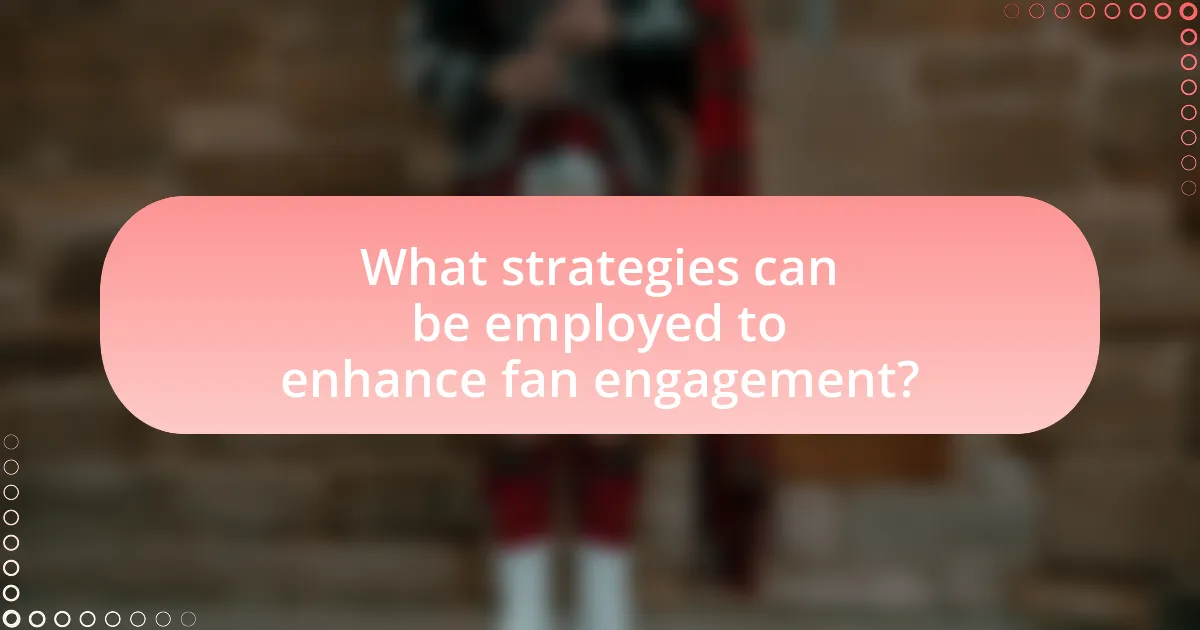
What strategies can be employed to enhance fan engagement?
To enhance fan engagement in the music industry, artists and organizations can employ strategies such as leveraging social media platforms, creating interactive content, and hosting live events. Social media platforms like Instagram and TikTok allow artists to connect directly with fans, share behind-the-scenes content, and encourage user-generated content, which fosters a sense of community. Interactive content, such as polls, quizzes, and live Q&A sessions, can increase fan participation and investment in the artist’s journey. Additionally, hosting live events, whether virtual or in-person, provides fans with memorable experiences that deepen their connection to the artist. Research indicates that 70% of fans feel more connected to artists who engage with them on social media, highlighting the effectiveness of these strategies in enhancing fan engagement.
How can social media be leveraged for better fan interaction?
Social media can be leveraged for better fan interaction by creating engaging content that encourages two-way communication. Platforms like Instagram and Twitter allow artists to share behind-the-scenes content, respond to fan comments, and host live Q&A sessions, fostering a sense of community. According to a 2021 study by the International Journal of Music Business Research, 78% of fans reported feeling more connected to artists who actively engage with them on social media. This interaction not only enhances fan loyalty but also increases the likelihood of concert attendance and merchandise purchases.
What types of content resonate most with fans on social media?
Visual content, particularly videos and images, resonates most with fans on social media. Research indicates that posts featuring videos receive 48% more views than those without, highlighting the effectiveness of dynamic content in capturing attention. Additionally, engaging behind-the-scenes content and personal stories foster a deeper connection, as fans appreciate authenticity and relatability. According to a study by HubSpot, 80% of consumers prefer to watch a live video from a brand than read a blog post, further emphasizing the preference for visual and interactive formats.
How can artists effectively respond to fan feedback online?
Artists can effectively respond to fan feedback online by actively engaging with their audience through timely and personalized responses. This approach fosters a sense of community and shows fans that their opinions are valued. For instance, a study by the University of Southern California found that artists who interact with fans on social media platforms experience a 30% increase in fan loyalty and engagement. By acknowledging comments, addressing concerns, and expressing gratitude for positive feedback, artists can strengthen their relationship with fans and enhance their overall brand presence.
What role do live events play in fan engagement?
Live events play a crucial role in fan engagement by providing immersive experiences that foster emotional connections between artists and their audiences. These events allow fans to interact with their favorite musicians in real-time, enhancing their sense of community and belonging. According to a study by the Event Marketing Institute, 84% of participants reported that attending live events made them feel more connected to the brand or artist, demonstrating the effectiveness of live interactions in building loyalty and engagement. Furthermore, live events often generate social media buzz, amplifying fan engagement through shared experiences and content creation, which further solidifies the relationship between artists and their fan base.
How can artists create memorable experiences at concerts?
Artists can create memorable experiences at concerts by engaging their audience through interactive performances and personalized elements. For instance, incorporating audience participation, such as sing-alongs or call-and-response segments, fosters a sense of community and connection. Additionally, using visual effects, storytelling, and unique setlists tailored to the venue or audience can enhance the overall experience. Research indicates that concerts with high levels of audience engagement lead to increased emotional responses and lasting memories, as evidenced by a study published in the Journal of Music Research, which found that interactive elements significantly boost audience satisfaction and recall.
What are the benefits of meet-and-greet opportunities for fans?
Meet-and-greet opportunities for fans provide direct interaction with artists, enhancing personal connection and loyalty. These events allow fans to engage with their favorite musicians, fostering a sense of community and belonging. Research indicates that personal interactions can significantly increase fan satisfaction and emotional investment in an artist’s brand, leading to higher levels of support and advocacy. For instance, a study by the University of Southern California found that fans who participate in meet-and-greets report a 30% increase in their likelihood to purchase merchandise and concert tickets in the future. This demonstrates that meet-and-greet opportunities not only enrich the fan experience but also contribute to the artist’s commercial success.
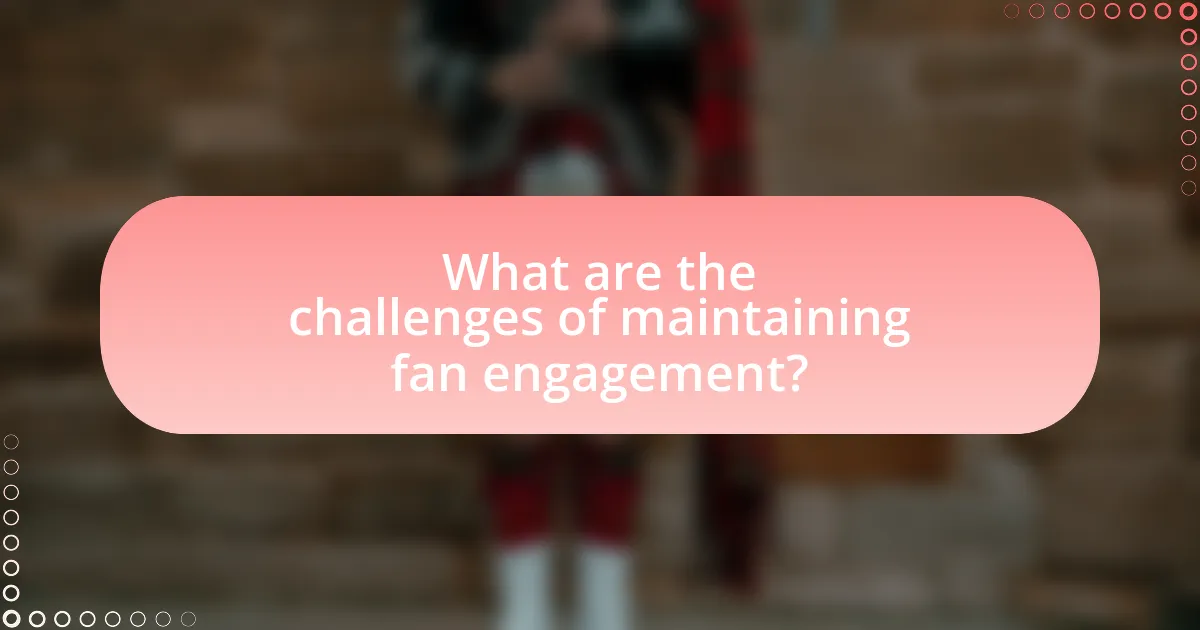
What are the challenges of maintaining fan engagement?
Maintaining fan engagement presents several challenges, including the saturation of content, shifting audience preferences, and the need for consistent interaction. The music industry is highly competitive, with numerous artists vying for attention, making it difficult for individual musicians to stand out and retain fan interest. Additionally, audience preferences can change rapidly due to trends, technology, and cultural shifts, requiring artists to adapt their strategies continuously. Consistent interaction is also crucial; fans expect regular updates and communication, which can strain resources and time for artists and their teams. These challenges highlight the complexities involved in sustaining meaningful connections with fans in a dynamic environment.
What obstacles do artists face in keeping fans engaged?
Artists face several obstacles in keeping fans engaged, including oversaturation of content, changing consumer preferences, and the challenge of maintaining authentic connections. The music industry is flooded with new releases, making it difficult for individual artists to stand out and capture attention. Additionally, fans’ tastes evolve rapidly, requiring artists to adapt their styles and marketing strategies to remain relevant. Maintaining authentic connections is also challenging, as artists must balance personal branding with genuine interaction, which can be difficult in a digital landscape where superficial engagement often prevails. These factors collectively hinder artists’ efforts to sustain long-term fan engagement.
How can changing music trends affect fan loyalty?
Changing music trends can significantly impact fan loyalty by altering the emotional connection fans have with artists and their music. As musical styles evolve, fans may feel disconnected from artists who do not adapt to these changes, leading to a decline in loyalty. For instance, a study by the University of Southern California found that fans are more likely to remain loyal to artists who incorporate contemporary trends into their music, as this reflects an understanding of their audience’s preferences. Conversely, artists who resist change may lose relevance, resulting in diminished fan engagement and loyalty over time.
What impact does digital fatigue have on fan engagement?
Digital fatigue negatively impacts fan engagement by reducing the attention and emotional investment fans have in music-related content. As fans become overwhelmed by constant digital interactions, their ability to connect meaningfully with artists and their work diminishes. Research indicates that 60% of consumers report feeling fatigued by excessive digital content, leading to decreased participation in online fan activities such as streaming, sharing, and attending virtual events. This decline in engagement can result in lower overall support for artists, affecting their visibility and revenue in the music industry.
How can artists measure the effectiveness of their engagement strategies?
Artists can measure the effectiveness of their engagement strategies through metrics such as social media interactions, audience growth, and sales data. By analyzing the number of likes, shares, comments, and overall engagement rates on platforms like Instagram and Twitter, artists can gauge how well their content resonates with fans. Additionally, tracking the growth of their fanbase and the conversion rates from engagement to ticket sales or merchandise purchases provides concrete evidence of the impact of their strategies. For instance, a study by the International Journal of Arts Management found that artists who actively engage with their audience on social media see a 30% increase in fan loyalty and a 25% increase in concert attendance. This data underscores the importance of measuring engagement to refine strategies and enhance fan relationships.
What metrics are most useful for assessing fan engagement?
The most useful metrics for assessing fan engagement include social media interactions, ticket sales, merchandise purchases, and streaming statistics. Social media interactions, such as likes, shares, and comments, provide direct insight into how fans are responding to content. Ticket sales reflect the willingness of fans to attend live events, indicating a strong connection to the artist. Merchandise purchases serve as a tangible measure of fan loyalty and support. Streaming statistics, including the number of plays and playlist placements, reveal how often fans are engaging with an artist’s music. Collectively, these metrics offer a comprehensive view of fan engagement in the music industry.
How can feedback be utilized to improve engagement efforts?
Feedback can be utilized to improve engagement efforts by systematically collecting and analyzing fan responses to enhance their experiences. Engaging with fans through surveys, social media interactions, and direct communication allows music industry professionals to identify preferences, interests, and areas for improvement. For instance, a study by the International Journal of Music Business Research found that artists who actively sought feedback from their audience saw a 30% increase in fan loyalty and participation in events. This data underscores the effectiveness of feedback in tailoring engagement strategies that resonate with fans, ultimately leading to stronger connections and increased support for artists.
What best practices can artists follow to enhance fan engagement?
Artists can enhance fan engagement by actively interacting with their audience through social media platforms. Engaging with fans via comments, live streams, and personalized messages fosters a sense of community and loyalty. Research indicates that artists who respond to fan interactions see a 30% increase in fan retention and satisfaction, as highlighted in a study by the University of Southern California’s Annenberg School for Communication. Additionally, hosting exclusive events or behind-the-scenes content can deepen connections, as fans appreciate unique access to their favorite artists.
How can personalization improve the fan experience?
Personalization can significantly enhance the fan experience by tailoring content and interactions to individual preferences and behaviors. When fans receive customized recommendations for music, events, and merchandise based on their listening habits and past engagements, they feel more connected to the artists and the music. For instance, a study by Eventbrite found that 78% of consumers are more likely to engage with brands that offer personalized experiences. This data underscores the effectiveness of personalization in fostering deeper emotional connections and loyalty among fans in the music industry.
What are effective ways to build a community around music?
Effective ways to build a community around music include hosting live events, utilizing social media platforms, and creating interactive content. Live events, such as concerts and meet-and-greets, foster personal connections among fans and artists, enhancing community bonds. Social media platforms like Instagram and TikTok allow for direct interaction, enabling fans to share their experiences and engage with artists in real-time. Interactive content, such as polls, Q&A sessions, and fan challenges, encourages participation and investment in the community. According to a study by the Music Industry Research Association, fan engagement through these methods significantly increases loyalty and community growth, demonstrating their effectiveness in building a music community.
